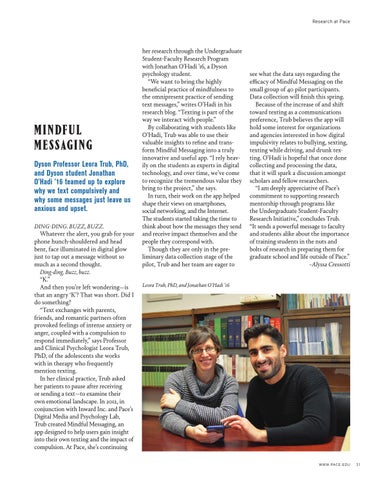Research at Pace
MINDFUL ME SSAGING Dyson Professor Leora Trub, PhD, and Dyson student Jonathan O’Hadi ’16 teamed up to explore why we text compulsively and why some messages just leave us anxious and upset. DING-DING. BUZZ, BUZZ. Whatever the alert, you grab for your phone hunch-shouldered and head bent, face illuminated in digital glow just to tap out a message without so much as a second thought. Ding-ding. Buzz, buzz. “K.” And then you’re left wondering—is that an angry ‘K’? That was short. Did I do something? “Text exchanges with parents, friends, and romantic partners often provoked feelings of intense anxiety or anger, coupled with a compulsion to respond immediately,” says Professor and Clinical Psychologist Leora Trub, PhD, of the adolescents she works with in therapy who frequently mention texting. In her clinical practice, Trub asked her patients to pause after receiving or sending a text—to examine their own emotional landscape. In 2012, in conjunction with Inward Inc. and Pace’s Digital Media and Psychology Lab, Trub created Mindful Messaging, an app designed to help users gain insight into their own texting and the impact of compulsion. At Pace, she’s continuing
her research through the Undergraduate Student-Faculty Research Program with Jonathan O’Hadi ’16, a Dyson psychology student. “We want to bring the highly beneficial practice of mindfulness to the omnipresent practice of sending text messages,” writes O’Hadi in his research blog. “Texting is part of the way we interact with people.” By collaborating with students like O’Hadi, Trub was able to use their valuable insights to refine and transform Mindful Messaging into a truly innovative and useful app. “I rely heavily on the students as experts in digital technology, and over time, we’ve come to recognize the tremendous value they bring to the project,” she says. In turn, their work on the app helped shape their views on smartphones, social networking, and the Internet. The students started taking the time to think about how the messages they send and receive impact themselves and the people they correspond with. Though they are only in the preliminary data collection stage of the pilot, Trub and her team are eager to
see what the data says regarding the efficacy of Mindful Messaging on the small group of 40 pilot participants. Data collection will finish this spring. Because of the increase of and shift toward texting as a communications preference, Trub believes the app will hold some interest for organizations and agencies interested in how digital impulsivity relates to bullying, sexting, texting while driving, and drunk texting. O’Hadi is hopeful that once done collecting and processing the data, that it will spark a discussion amongst scholars and fellow researchers. “I am deeply appreciative of Pace’s commitment to supporting research mentorship through programs like the Undergraduate Student-Faculty Research Initiative,” concludes Trub. “It sends a powerful message to faculty and students alike about the importance of training students in the nuts and bolts of research in preparing them for graduate school and life outside of Pace.” –Alyssa Cressotti
Leora Trub, PhD, and Jonathan O’Hadi ’16
W WW.PACE .E DU
31
